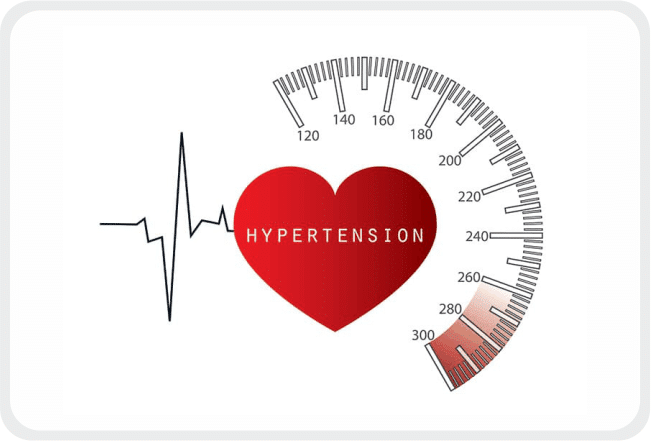
Hypertension
Hypertension is another name for high blood pressure. It can lead to severe complications and increases the risk of heart disease, stroke, and death. High blood pressure or hypertension occurs when your blood pressure increases to unhealthy levels.
Your blood pressure measurement considers how much blood is passing through your blood vessels and the amount of resistance the blood meets while the heart is pumping. Medical guidelines define hypertension as blood pressure higher than 130 over 80 millimeters of mercury (mmHg), according to guidelines issued by the American Heart Association (AHA)
Causes :
The cause of hypertension is often not known, but there are several risk factors which increase the chances of having hypertension, which are:
- Age: Hypertension is more common in people aged over 60 years. With age, blood pressure can increase steadily as the arteries become stiffer and narrower due to plaque build-up.
- Ethnicity: Some ethnic groups are more prone to hypertension.
- Size and weight: Being overweight or obese is a key risk factor.
- Alcohol and tobacco: Consuming large amounts of alcohol regularly can increase a person’s blood pressure, as can smoking tobacco.
- Gender: The lifetime risk is the same for males and females, but men are more prone to hypertension at a younger age. The prevalence tends to be higher in older women.
- Existing health conditions: Cardiovascular disease, diabetes, chronic kidney disease, and high cholesterol levels can lead to hypertension, especially as people get older.
Other contributing factors include:
- physical inactivity
- a salt-rich diet associated with processed and fatty foods
- low potassium in the diet
- certain medications
- Genetic predisposition
Symptoms :
A person with hypertension may not notice any symptoms, and it is often called the “silent killer.” While undetected, it can cause damage to the cardiovascular system and internal organs, such as the kidneys. Regularly checking your blood pressure is vital, as there will usually be no symptoms to make you aware of the condition. It is listed that high blood pressure causes sweating, anxiety, sleeping problems, and blushing. However, in most cases, there will be no symptoms at all. If the blood pressure reaches the level of a hypertensive crisis, a person may experience headaches, nosebleeds, shortness of breath, but these signs and symptoms aren’t specific and usually don’t occur until high blood pressure has reached a severe or life-threatening stage.
Management at AktivHealth :
There are a number of physical activity interventions that can help you be active and lower blood pressure. Many hypertension patients worry about exercising safely, or they may struggle with injuries, disabilities or age-related conditions.
At AktivHealth, we work with you to develop a program of exercise to increase your physical activity safely and effectively and help identify necessary and achievable changes in your lifestyle. Our program may be a combination of aerobic training, strength-endurance training and flexibility exercises.
Obesity being a risk factor for hypertension, we can help patients who are overweight or obese to tackle hypertension. Our comprehensive obesity management program involves the identification of diet and exercise strategies targeted towards overweight individuals.
Regular physical activity makes your heart stronger and your blood vessels more flexible. A strong heart can pump more blood with less effort. If your heart can work less hard to pump blood throughout your body, the force on your arteries decreases, thereby lowering your blood pressure.
Becoming more active can lower your systolic blood pressure — the top number in a blood pressure reading — by an average of 4 to 9 millimeters of mercury (mm Hg). That improvement is as good as some blood pressure medications.
Important: Hypertension patients must always be consulted by our Doctors (or patient’s GP) first before embarking on any treatment option. Highly elevated blood pressure, in which the upper value is above 180 or the lower value is above 110, should be treated by a medical doctor immediately.









